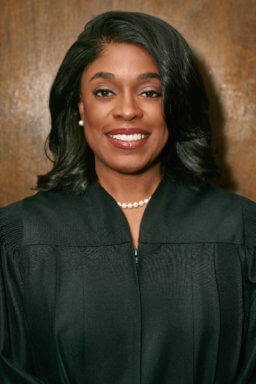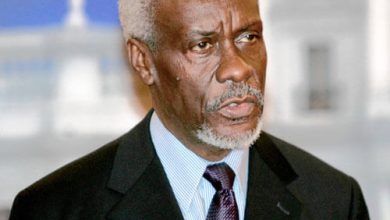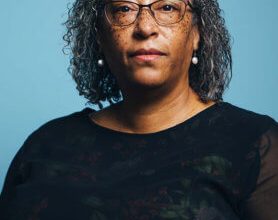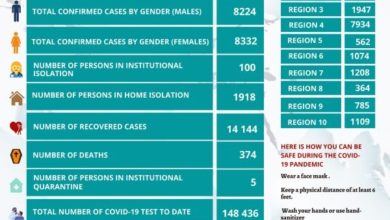Judge Dweynie Paul tells of COVID-19 impact on court

Haitian American Judge Dweynie Esther Paul, a Kings County (Brooklyn) civil court judge, tells of the impact of the COVID-19 pandemic on the New York court system.
Judge Paul, who, in 2015, became the first Haitian-American to be elected a civil court judge in the State of New York, told Caribbean Life on Monday that, in March 2020, “the world, as we knew it, changed forever.
“As our friends, family members and co-workers began to get sick from households to communities, from states to countries, we became aware of the deadly global pandemic,” said Judge Paul, who was born in Queens and currently resides in the Bedford-Stuyvesant, Brooklyn. “COVID-19 impacted every area of our lives, and the court system was no different.
“I believe it was March 16, 2020, when the court closed and converted to virtual operations, almost overnight,” added the judge, the first generation in her family to be born in the United States; her mother is from Port-de-Paix (north Haiti), and her father is from Port-au-Prince, the Haitian capital.
“I saw the anxiety and fear in litigants’ faces when they entered my courtroom in Civil Court,” continued Judge Paul, who currently presides over cases in Civil Court, hearing small claims, commercial landlord tenant, consumer debt, first-party benefits, personal injury and other civil trials.
She said some litigants were visibly sick, while others were uncertain about “what was going on in the world around us.”
“I can recall my own increased level of uncertainty about what we were facing,” Judge Paul said. “By late morning, Court Administration gave us a directive to adjourn our cases, not to enter a default against anyone who did not appear in court and release the litigants as soon as possible, because the court would be closing for the day.
“I did not know when or how we were going to return,” she added, stating that she worked alongside court staff to “diligently identify who appeared in court for their case and adjourn it as quickly as possible.”
Judge Paul said she remembered standing up in her courtroom and trying to find comforting words to say to litigants.
“All I could say was ‘I know we are all concerned for our health and safety. We are going to get to your case as soon as possible, so that you can leave. If you are not feeling well, please write your name, index number and the name of your case on a piece of paper, and you are free to leave,’” she said.
“We never did return to ‘business as usual,’” she added. “Instead, we quickly built upon our ingenuity, dedication to excellence and equal access to the courts by converting from in-person to virtual proceedings.”
Judge Paul said a COVID-19 hotline was created, where people could call and speak to a live representative from the various courts, and get information on active and potential future cases.
She said the court closely monitored all executive orders from the governor, and implemented rules and procedures, with a goal of “uniform equity and public safety.”
“Like many other industries, we were forced to limit the types of cases we heard to ‘essential’ and ‘emergency’ requests at the onset of the pandemic,” Judge Paul said.
By June 2020, she said judges and court attorneys were back in the courthouse, although conferences remained virtual, and that a fraction of the court officers and clerks returned to the building in rotating shifts.
“They became our frontline workers, interfacing with the public directly,” Judge Paul said.
She said one of the greatest challenges was ensuring that some of the most vulnerable court users, self-represented litigants without lawyers, had equal access to the court.
“We mailed letters to their homes, instructing them on how to log on by phone or video,” Judge Paul said.
She said some lawsuits were able to be filed online, and that what was once a pilot program, in select courts to go paperless, went “full speed ahead, scanning and uploading motions papers and evidence in all courts.”
Today, Judge Paul said the courtrooms are outfitted with plexiglass, and that there are safety protocols in place, disclosing that the courts follow a hybrid model for in-person and virtual appearances.
For instance, she said parties in small claims and consumer debt cases, who tend to be self-represented, have resumed in-court proceedings, with some exceptions.
The judge also said cases, which typically have attorneys on both sides, such as no-fault and commercial landlord/tenant, remain virtual.
She said court interpreters and stenographers are available in-person and virtually, and that jury trials have resumed in most courts throughout the State.
“Our commitment to alternative dispute resolution, like mediation still stands,” Judge Paul said. “We took the best parts of our technological advancements and incorporated them into the court’s function.
“We have navigated through what we hope was the worst of the pandemic and have emerged stronger, with a continued goal of equal access to justice,” she added.
Judge Paul said she began her legal career within the court system as a judicial law clerk for an administrative judge of the Baltimore City Circuit Court.
As a Judicial Law Clerk, she worked to resolve disputes in the areas of civil, family and criminal law.
Judge Paul said she later became in-house counsel for an insurance company, representing people in Supreme, Civil and Small Claims Court proceedings, where she litigated various issues such as contract disputes, premise liability, personal injury, property damage, products liability, intentional torts, and lawsuits related to residential and commercial real estate claims.
For over 12 years, Judge Paul said she practiced law throughout New York State, dedicating some of her practice to alternative dispute resolution, having obtained extensive training.
She said she managed a team of paralegals and oversaw attorneys’ arbitration submissions before the American Arbitration Association.
But Judge Paul said she has never wavered from her commitment to the community.
As the former Director of Community Service for the Metropolitan Black Bar Association and former member of Community Board 3, she said developed programs and workshops that served to create “greater access to justice, resources and information for our communities.”
She said she organized the first annual Community Law Day, annual Domestic Violence workshops, and founded the Young Men’s Leadership Initiative.
As a Deacon at Mt. Lebanon Baptist Church, Judge Paul said she leads a ministry that supports caregivers, both spiritually and by providing practical resources for elder care and mental health.
She said her work as secretary of the Judicial Friends Association, an organization of New York State Black Judges, serves to “promote diversity in the courts and support a pipeline for others entering the legal field.”
In 2015, Judge Paul said she became the first person of Haitian-American descent to be elected Civil Court Judge in the State of New York.
She commenced her term in 2016, presiding in Family Court, focusing on custody, visitation, domestic violence, adoptions, guardianship and child support objections.
Judge Paul said she sat on the Administrative Judge’s Advisory Committee “in an effort to improve Family Court statewide.”
Understanding the need to bridge the gap between the community and the courts, she said she collaborated with the NYS Unified Court System’s Office of Justice Initiatives to create events like Clergy Day and programs that expand free supervised visitation for parents and children.
Paul attended SUNY Stony Brook University, obtaining a dual Bachelor of Arts degree in political science and social science, with a minor in child and family studies.
While in college, she studied abroad in London, England, at Middlesex University within its British Legal System Program.
On her return to the United States, Judge Paul said she gained “first-hand knowledge” of criminal proceedings by interning for a justice of the Queens County Criminal Supreme Court.
Afterwards, she completed a Master of Arts degree in public policy at SUNY Stony Brook.
As a policy analyst for the NYS Comptroller’s Office, Judge Paul said studied immigration-related issues, with a focus on immigrants’ ability to gain access to essential resources, such as education, employment and healthcare, and their impact on the economy.
Subsequently, Paul attended George Washington University School of Law in Washington, D.C., obtaining her Juris Doctorate (law) degree.
While in D.C., she worked in the Vaccine Injury Litigation Clinic, appearing before the US Court of Federal Claims and negotiating with the US Department of Justice on behalf of injured persons.





